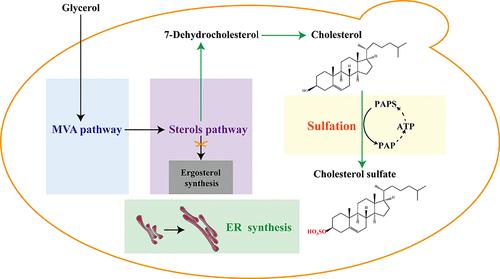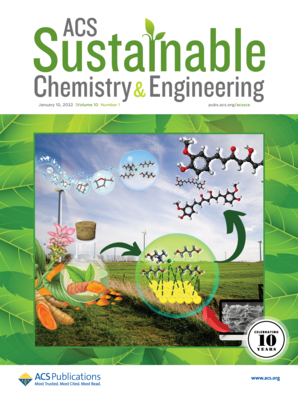Establishing Komagataella phaffii as a Cell Factory for Efficient Production of Cholesterol Sulfate
IF 7.1
1区 化学
Q1 CHEMISTRY, MULTIDISCIPLINARY
引用次数: 0
Abstract
Cholesterol sulfate (CS), a sulfated derivative of cholesterol, has important applications in the medical field, because of its extensive biological and pharmacological activities. As the supply of CS heavily relies on chemical conversion of cholesterol extracted from wool grease, there is growing interest in engineering microbial cell factories for large-scale production of CS. This study reports microbial production of CS in the yeast, Komagataella phaffii (also known as Pichia pastoris), for the first time. Through combinatorial metabolic engineering strategies, including blocking the competing branches, overexpressing the rate-limiting mevalonate pathway genes, manipulating lipid metabolism, and enhancing the supply of key cofactor 3′-phosphoadenosine-5′-phosphosulfate (PAPS), CS production was increased more than 6.8-fold when compared with the parent strain. The optimal strain (CHS0505) produced CS with titers reaching 249 mg/L in a shake flask and 545 mg/L in a fed-batch fermenter, highlighting the potential of K. phaffii as a cell factory for steroid production. More importantly, the development of a CS-producing cell factory will advance microbial production of glycosaminoglycans and other sulfated natural products via synthetic biology.

求助全文
约1分钟内获得全文
求助全文
来源期刊

ACS Sustainable Chemistry & Engineering
CHEMISTRY, MULTIDISCIPLINARY-ENGINEERING, CHEMICAL
CiteScore
13.80
自引率
4.80%
发文量
1470
审稿时长
1.7 months
期刊介绍:
ACS Sustainable Chemistry & Engineering is a prestigious weekly peer-reviewed scientific journal published by the American Chemical Society. Dedicated to advancing the principles of green chemistry and green engineering, it covers a wide array of research topics including green chemistry, green engineering, biomass, alternative energy, and life cycle assessment.
The journal welcomes submissions in various formats, including Letters, Articles, Features, and Perspectives (Reviews), that address the challenges of sustainability in the chemical enterprise and contribute to the advancement of sustainable practices. Join us in shaping the future of sustainable chemistry and engineering.
 求助内容:
求助内容: 应助结果提醒方式:
应助结果提醒方式:


